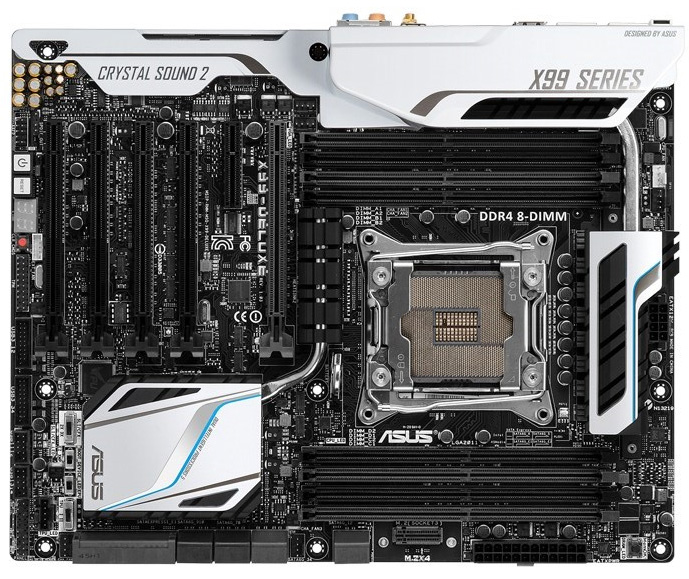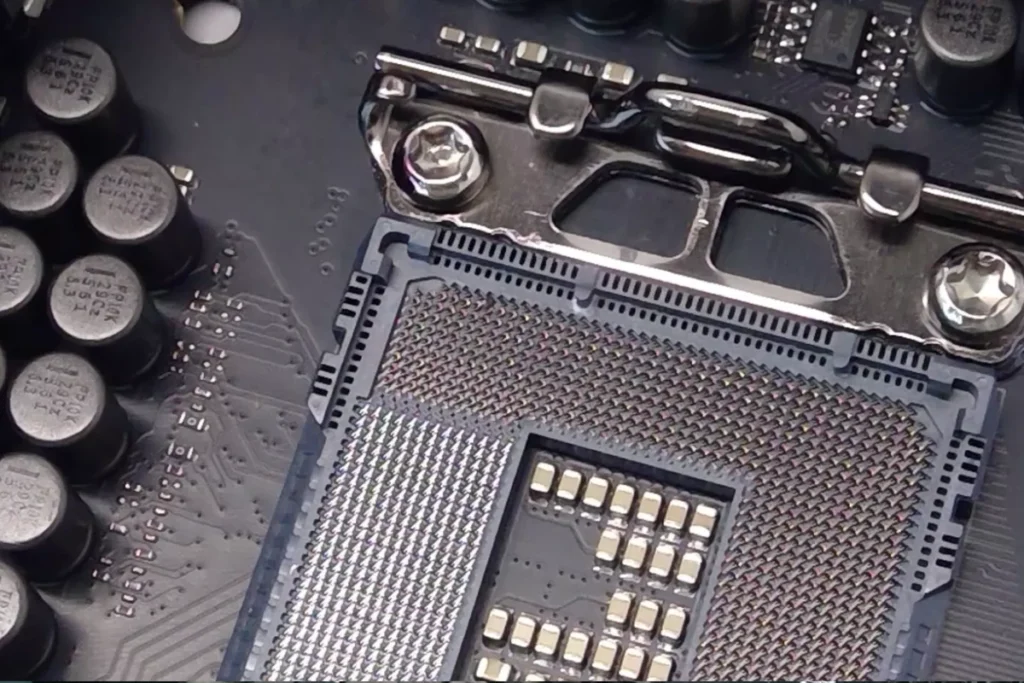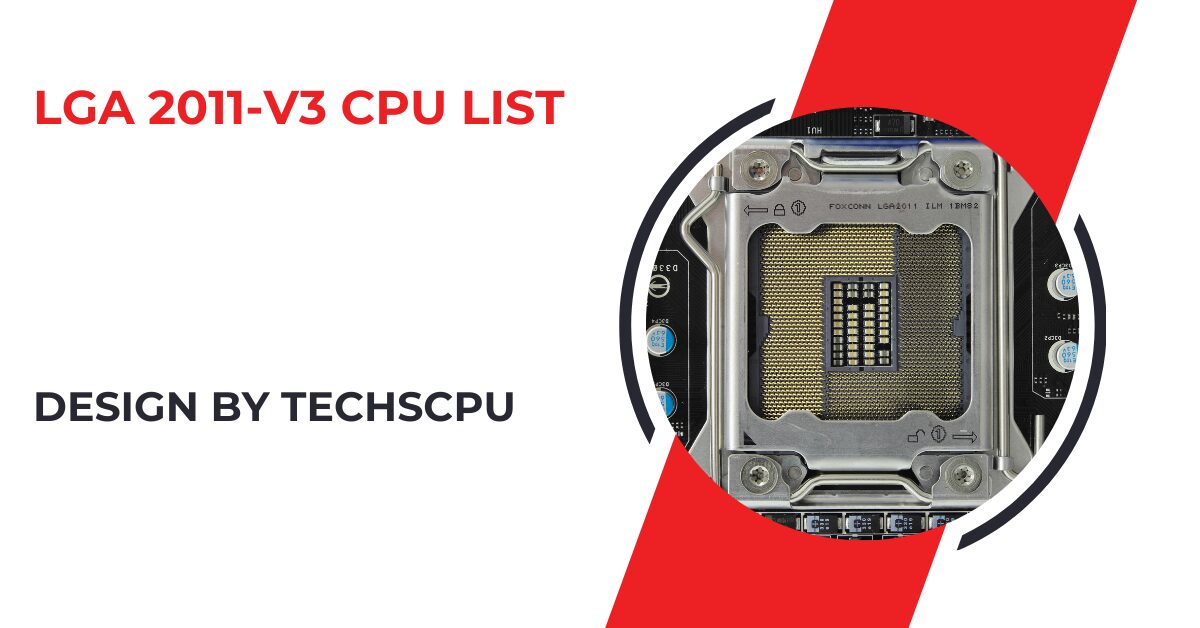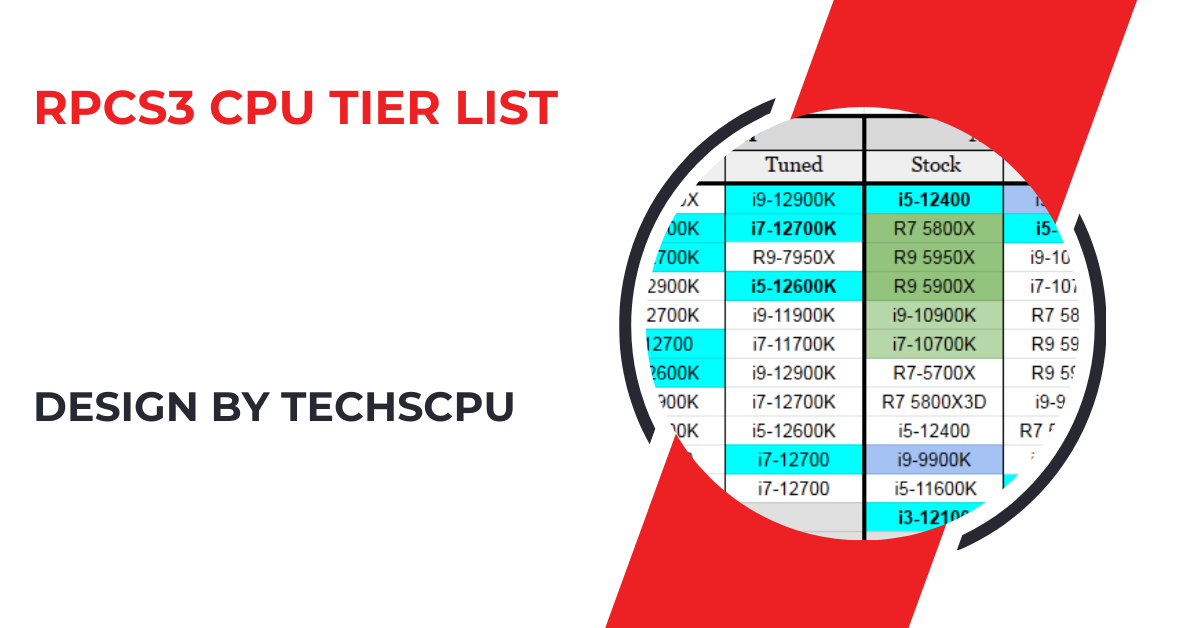The LGA 2011-v3 socket supports high-performance Intel Haswell-E and Broadwell-E CPUs, ideal for gaming, content creation, and professional use with advanced features.
Introduction to LGA 2011-v3:

The LGA 2011-v3 socket, also known as Socket R3, is a high-performance CPU socket designed by Intel. It is primarily used in Intel’s Haswell-E and Broadwell-E series of processors, which are popular for their exceptional performance in gaming, content creation, and professional applications. If you’re looking to upgrade your system or build a powerful workstation, understanding the range of CPUs available for the LGA 2011-v3 socket is crucial.
Key Features of LGA 2011-v3 CPUs:
- High Core Count: LGA 2011-v3 CPUs typically come with a higher number of cores and threads, making them ideal for multitasking and heavy computational workloads.
- Enhanced Performance: These processors support quad-channel DDR4 memory, offering superior memory bandwidth compared to previous generations.
- Advanced Technologies: LGA 2011-v3 CPUs include support for Intel Turbo Boost Technology, Hyper-Threading, and advanced virtualization features, making them versatile for various demanding applications.
- Overclocking Potential: Many CPUs for this socket are unlocked, allowing enthusiasts to push their performance beyond stock settings.
Comprehensive List of LGA 2011-v3 CPUs:
Intel Core i7-5820K:
- Cores/Threads: 6/12
- Base Clock: 3.3 GHz
- Turbo Boost Clock: 3.6 GHz
- Cache: 15 MB
- TDP: 140W
- Key Features: Great for gaming and entry-level content creation, unlocked for overclocking.
- Ideal Use Cases: The i7-5820K is a solid choice for gamers and content creators who need a balanced mix of performance and affordability. Its 6 cores and 12 threads provide ample power for modern games and software, while its unlocked multiplier makes it a favorite among overclockers looking to extract extra performance.
Intel Core i7-5930K:
- Cores/Threads: 6/12
- Base Clock: 3.5 GHz
- Turbo Boost Clock: 3.7 GHz
- Cache: 15 MB
- TDP: 140W
- Key Features: Higher base and boost clocks than the i7-5820K, excellent for intensive applications.
- Ideal Use Cases: The i7-5930K is ideal for users who require a bit more speed for tasks such as video editing, 3D rendering, and gaming at higher resolutions. The increased base and boost clocks offer noticeable improvements in performance-intensive scenarios.
Intel Core i7-5960X:
- Cores/Threads: 8/16
- Base Clock: 3.0 GHz
- Turbo Boost Clock: 3.5 GHz
- Cache: 20 MB
- TDP: 140W
- Key Features: The flagship model in the i7 series, offering superior multi-threaded performance.
- Ideal Use Cases: The i7-5960X excels in highly threaded workloads such as video editing, 3D modeling, and scientific computations. Its 8 cores and 16 threads provide exceptional parallel processing capabilities, making it a top choice for professionals and enthusiasts who demand the best performance.
Intel Core i7 Extreme Edition Series:
Intel Core i7-6950X:
- Cores/Threads: 10/20
- Base Clock: 3.0 GHz
- Turbo Boost Clock: 3.5 GHz
- Cache: 25 MB
- TDP: 140W
- Key Features: The ultimate processor for extreme multitasking, gaming, and professional applications.
- Ideal Use Cases: The i7-6950X is designed for extreme multitasking and heavy-duty applications. With 10 cores and 20 threads, it is perfect for video production, 3D rendering, and other intensive tasks. Its high core count and large cache ensure smooth performance even under the most demanding conditions.
Intel Core i7-6900K:
- Cores/Threads: 8/16
- Base Clock: 3.2 GHz
- Turbo Boost Clock: 3.7 GHz
- Cache: 20 MB
- TDP: 140W
Key Features: Excellent performance for both gaming and productivity, slightly lower core count than the 6950X but higher clock speeds.
Ideal Use Cases: The i7-6900K offers a great balance between core count and clock speed, making it ideal for high-end gaming and productivity tasks. Its higher base and turbo clocks provide better single-threaded performance, which is beneficial for gaming and certain professional applications.
Intel Xeon Series:
Intel Xeon E5-2620 v3:
- Cores/Threads: 6/12
- Base Clock: 2.4 GHz
- Turbo Boost Clock: 3.2 GHz
- Cache: 15 MB
- TDP: 85W
- Key Features: Ideal for entry-level servers and workstations, lower power consumption.
- Ideal Use Cases: The E5-2620 v3 is perfect for entry-level servers and workstations that need reliable performance with lower power consumption. Its 6 cores and 12 threads make it suitable for tasks such as web hosting, database management, and virtual machines.
Intel Xeon E5-2699 v3:
- Cores/Threads: 18/36
- Base Clock: 2.3 GHz
- Turbo Boost Clock: 3.6 GHz
- Cache: 45 MB
- TDP: 145W
- Key Features: Exceptional for highly parallel workloads, data centers, and complex simulations.
- Ideal Use Cases: The E5-2699 v3 is a powerhouse for data centers and applications requiring massive parallel processing. With 18 cores and 36 threads, it excels in running large-scale simulations, big data analytics, and high-performance computing (HPC) environments.
Intel Xeon E5-2680 v3:
- Cores/Threads: 12/24
- Base Clock: 2.5 GHz
- Turbo Boost Clock: 3.3 GHz
- Cache: 30 MB
- TDP: 120W
- Key Features: Balanced performance for demanding applications, ideal for high-end workstations.
- Ideal Use Cases: The E5-2680 v3 is suited for high-end workstations that need a balance of cores, clock speed, and power consumption. It is ideal for applications such as CAD, 3D rendering, and software development that require both single-threaded and multi-threaded performance.
Choosing the Right LGA 2011-v3 CPU:

When selecting an LGA 2011-v3 CPU, consider the following factors:
- Intended Use: For gaming and general-purpose use, an Intel Core i7 processor is a great choice. For professional applications and servers, a Xeon processor may be more suitable.
- Core Count and Threads: Higher core and thread counts are beneficial for multitasking and applications that can leverage parallel processing.
- Clock Speed: Higher clock speeds generally translate to better performance in single-threaded applications and gaming.
- Budget: While LGA 2011-v3 CPUs offer excellent performance, they can be expensive. Balance your performance needs with your budget.
- Overclocking Needs: If you are an enthusiast looking to overclock your CPU for extra performance, choose an unlocked processor such as the i7-5820K, i7-5930K, or i7-5960X.
FAQ’s:
1. What is the LGA 2011-v3 socket?
The LGA 2011-v3 socket, also known as Socket R3, is a high-performance CPU socket designed by Intel, primarily used in Haswell-E and Broadwell-E processors.
2. Which CPUs are compatible with LGA 2011-v3?
Compatible CPUs include Intel Core i7 series (i7-5820K, i7-5930K, i7-5960X) and Intel Xeon series (E5-2620 v3, E5-2699 v3, E5-2680 v3).
3. What are the key features of LGA 2011-v3 CPUs?
Key features include high core count, enhanced performance with quad-channel DDR4 memory, support for Intel Turbo Boost and Hyper-Threading, and overclocking potential.
4. What are the benefits of using an Intel Xeon CPU with LGA 2011-v3?
Intel Xeon CPUs offer exceptional performance for highly parallel workloads, data centers, and professional applications requiring massive parallel processing.
5. How do I choose the right LGA 2011-v3 CPU?
Consider factors such as intended use, core count and threads, clock speed, budget, and whether you need overclocking capabilities.
Conclusion:
The LGA 2011-v3 socket hosts some of the most powerful processors available, making it a top choice for gamers, content creators, and professionals seeking high-performance computing. Whether you’re building a new system or upgrading an existing one, understanding the options available will help you make an informed decision. With this comprehensive guide, you’re well-equipped to choose the best LGA 2011-v3 CPU for your needs.
Related Post
- Also Read: Travel Tweaks Offers – The Best Deals for Smart Travelers!
- Also Read: Mylt34 – Everything You Need to Know!
- Also Read: What Moves The Dead – A Spine-Chilling Gothic Horror Novel!



